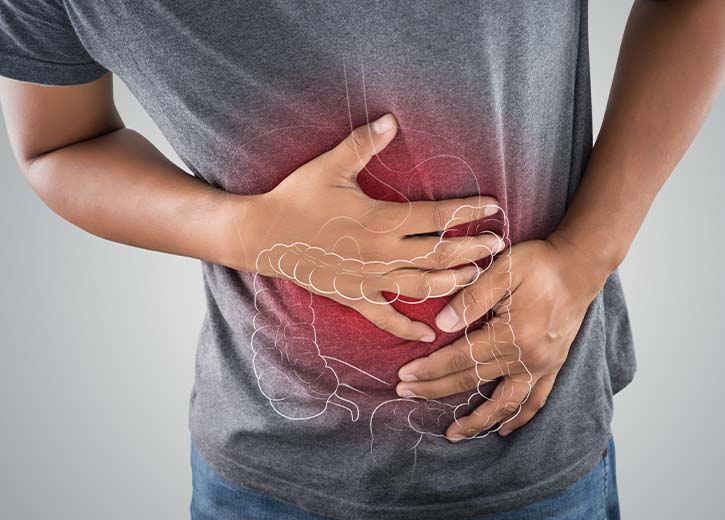Overview:
Ulcerative colitis (UC) is an inflammatory bowel disease (IBD). IBD refers to a group of diseases affecting the gastrointestinal (GI) tract.
When the lining of your large intestine (also known as the colon), rectum, or both become inflamed, you develop UC.
On the lining of your colon, this inflammation causes tiny sores known as ulcers. Typically, inflammation begins in the rectum and spreads upward. It can affect your entire colon.
Because of the inflammation, your bowel moves quickly and empties frequently. Ulcers form when cells on the surface of the lining of your bowel die. Ulcers can cause bleeding as well as the discharge of mucus and pus.
Causes Researchers believe ulcerative colitis is caused by a complex set of factors. They believe it is the result of an overactive immune response. The immune system's job is to keep the body safe from germs and other potentially harmful substances. However, your immune system can mistakenly attack your body, causing inflammation and tissue damage.
Symptoms
The severity of UC symptoms varies between people with the condition. Symptoms can also shift over time.
People with UC may have periods of mild symptoms or no symptoms at all. This is known as remission. However, symptoms can return and worsen. This is known as a flare-up.
Some of the common symptoms include:
· Diarrhea, often with blood or pus
. Abdominal pain and cramping
· Rectal pain
· Rectal bleeding — passing small amount of blood with stool
· Urgency to defecate
· Inability to defecate despite urgency
· Weight loss
· Fatigue
· Fever If you experience any symptoms, consult the best gastroenterologist in Dubai.
Diet is the key
There is no special diet for UC patients. Everyone reacts differently to food and drink. A few general rules, however, may be useful for people attempting to avoid a flare-up:
Consume a low-fat diet. It's unclear why a low-fat diet is beneficial, but foods high in fat are known to cause diarrhoea, especially in people with IBD. Eating more low-fat foods may help to prevent flare-ups. When you do consume fat, choose healthier options such as olive oil and omega-3 fatty acids.
Treatment
Typically, ulcerative colitis is treated with medications that reduce inflammation in the large intestine and aid in the onset and maintenance of remission. Doctors may recommend surgery to treat ulcerative colitis or complications in some cases.
There is no solid evidence that your diet influences whether you develop UC. When you have a flare-up, you may find that certain foods and drinks aggravate your symptoms.
Practices that may be beneficial, include:
· Consuming small amounts of water throughout the day.
· Eating smaller meals throughout the day, and limiting your consumption of high fibre foods.
· Avoidance of fatty foods.
· Reducing your milk consumption if you are lactose intolerant.
If you have UC, your condition must be monitored by a doctor, and you must strictly adhere to your treatment plan for the rest of your life. Aster Hospitals is one of the best gastroenterology hospitals in Dubai.



